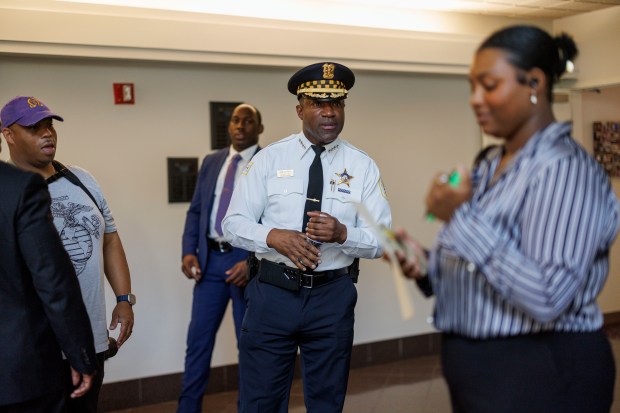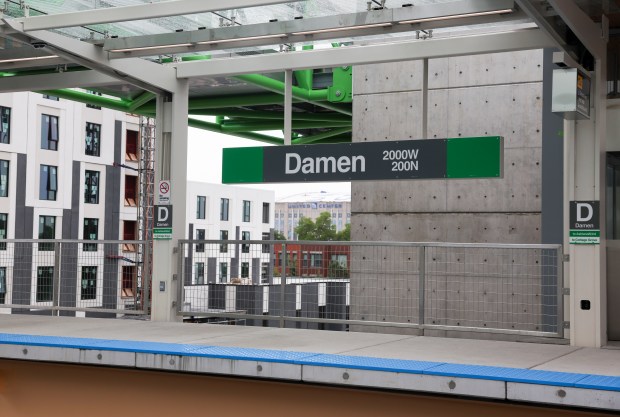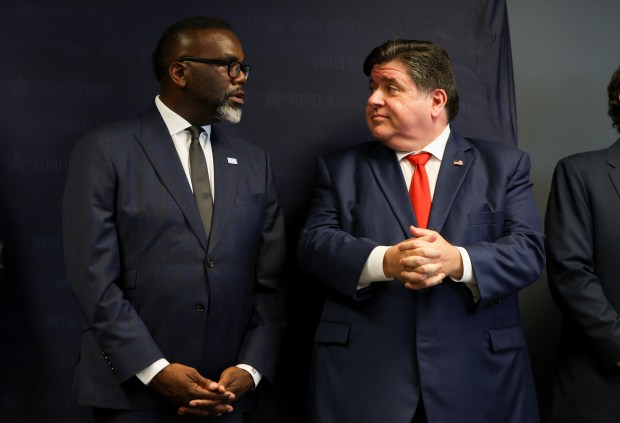More than a year after Chicago was announced as the host city, the Democratic National Convention is about to start.
Running Monday through Thursday, the convention is a huge moment for national Democrats, who have had a whirlwind few weeks since President Joe Biden quit the race, paving the way for Vice President Kamala Harris to become the first Black and Asian American woman to a lead major party ticket.
Eyes will also be on Mayor Brandon Johnson and Gov. JB Pritzker, who are looking to pull off the massive made-for-TV event without a hitch, building on the success of the 1996 Democratic convention and continuing to push aside historic images of the contentious 1968 DNC.
And yes, the festivities will probably disrupt the routines of anyone near the convention’s two main venues, the United Center and McCormick Place.
Here’s what to know.
What’s expected at the convention?
Traditionally, party leaders come together every four years to nominate the person they want on the top of the presidential ticket in November. Republicans held their convention last month in Milwaukee.
There’s a few untraditional things about this year’s DNC, though.
Typically, the person nominated emerged victorious through primary elections across the country in spring and summer. This year is different for Democrats since Biden dropped out of the race in July.
Harris, Biden’s vice president, has already been nominated in an online roll-call of delegates to be the Democratic nominee, so there won’t be a formal, official vote to nominate her at the convention.
Instead there will be a ceremonial roll call, speeches from party leaders and up-and-comers, and an introduction of Harris’ recently announced running mate, Minnesota Gov. Tim Walz. It’ll be a televised rally of support to build on Harris’ fundraising and polling momentum from the past month.
Who will be there, and what’s the schedule of events?
Nearly all of the Democratic Party’s well-known officeholders will be joined by thousands of delegates and other supporters and volunteers, along with thousands of members of the media, at the main venues: McCormick Place, south of the Loop, and the United Center on the Near West Side. In addition, organizers are predicting thousands of protesters will take to the streets to bring attention to issues that include the war in Gaza.
There will likely also be some A-list celebrity sightings at the convention sites and around town. Billie Eilish and Julia Louis-Dreyfus took part in Democrats’ last national convention, which was primarily virtual due to the pandemic.
Overall, the DNC estimates some 50,000 visitors will come to Chicago for the convention.
Convention events at the United Center and McCormick Place are not open to the public.
Much of the schedule, including the speaker list, has yet to be announced, although Pritzker and former President Barack Obama are among those that figure to have prominent slots. Daytime party business and meetings will largely take place at McCormick Place, according to the DNC. Evening events, including the major speeches and hoopla that is likely to be televised, will be at the United Center.
Harris is expected to give the convention’s final speech on Thursday, with Walz expected to speak Wednesday.
What is the city doing to prepare?
Residents are advised to download the OEMC Chicago app for the latest updates about disruptions around the United Center and McCormick Place.
Ivan Capifali, acting commissioner of Chicago’s Office of Business Affairs and Consumer Protection, said nearly 1,400 businesses had been contacted in initial canvassing. Establishments closer to the venues had been canvassed again in the past few weeks, he said.
Along with logistics for the convention itself, Johnson has said the city is prepared for the possibility that thousands of migrants could arrive from the southern border, sent by Republican Texas Gov. Greg Abbott and others.
Police Superintendent Larry Snelling has stressed that the department has undergone rigorous training on both crowd control and First Amendment issues.
City workers have spent months beautifying downtown and making preparations across the city, from sidewalk repairs to new signs and better lighting.
What is the plan for protests?

Johnson’s administration proposed that many protesters march west from Union Park, past a small park north of the United Center and then east back to Union Park. Officials announced the route after a coalition of pro-Palestinian protest groups sued to block the city from confining protesters to a two-block strip of Grant Park, far from the United Center.
U.S. District Judge Andrea Wood ruled that she would not force City Hall to widen and lengthen the authorized route, as some protesters had sought.
Park No. 578 just north of the United Center will also serve as a “free speech zone,” Glen Brooks, director of community policing at the Chicago Police Department, said.
The latest information about protest routes will be communicated through the OEMC app, Brooks said.
What areas will be most affected?
The neighborhoods immediately around the United Center and McCormick Place will be most affected, and work has started on building out the security perimeter. Full street closures in the security zones are expected starting this coming weekend, before the convention starts. A pedestrian-only zone around the United Center will stretch between approximately Washington Boulevard on the north to Adams Street on the south, and from Seeley Avenue on the west to a point between Wood and Paulina streets on the east.
Only people with credentials who “have a need to be there” will be allowed in that zone, 2024 DNC coordinator Jeff Burnside said.
A vehicle screening zone around the United Center will extend east and south of the pedestrian-only zone by about a block.
McCormick Place will also have a “red zone” for pedestrians surrounded by high fences, and a slightly larger vehicle screening zone to the east, west and north. That larger zone is outlined roughly by Michigan Avenue, 21st Street and the Stevenson Expressway.
The restrictions at McCormick Place are scheduled to take effect at 10 p.m. Friday. The zone around the United Center kicks in at 7 p.m. the next day, with streets in the area expected to reopen Aug. 23.
There will be traffic aides from OEMC in the areas most affected, OEMC spokesperson Mary May said.
How will the convention affect traffic and public transit in the city?

Public transit riders should expect delays as buses will be rerouted on streets near the convention sites. No significant extra train service will be added, CTA President Dorval Carter has said, though passengers might see additional trains from airports. The CTA earlier this month celebrated the long-awaited opening of its new Damen Green Line station near the United Center ahead of the convention.
There will be parking restrictions in the security zones, which are expected to be posted before the zones go into effect. Bikes will be allowed in the outer vehicle-swept areas but not within the pedestrian-only security zones.
Traffic will also be disrupted on the eastern end of I-55. Between DuSable Lake Shore Drive and State Street, no vehicles larger than a passenger car will be permitted. The exit to MLK Boulevard from the expressway will be closed to general traffic.
On the Kennedy Expressway, center lanes will remain closed to the general public due to ongoing construction but could be used for motorcades or law enforcement vehicles.
Other street closures may occur, officials have said.
CPD’s helicopters will be in use throughout the week “to support neighborhood and district operations,” according to Brooks. The Secret Service will also likely fly drones or helicopters along with motorcades.
Metra will run hourly shuttles between O’Hare International Airport and downtown during the convention, and the CTA has committed to providing buses to specifically transport people participating in the convention.
What are the plans for televised coverage?
Cable news channels, including CNN and MSNBC, will likely carry much of the top prime time programming live. The DNC will broadcast its own feed on social media and its website, DemConvention.com, as well as on Amazon Prime Video. The major networks are expected to offer some prime time coverage. Events will also be available through streaming services.
“The Late Show with Stephen Colbert” plans to broadcast from the Auditorium Theatre downtown throughout the week of the DNC — suggesting the Emmy-winning, formerly Chicago-based comedian and Northwestern University alum plans to host guests from the United Center on his late-night show.
Comedy Central’s “The Daily Show” will also broadcast from Chicago during the convention, including a live show Aug. 22.
How many political conventions has Chicago hosted?
Chicago has hosted 25 major party national conventions, 14 for Republicans and 11 for Democrats, since 1860, when Abraham Lincoln was nominated by Republicans, according to the Chicago History Museum. That’s the most of any U.S. city, with the runner-up, Baltimore, having hosted 10.
Chicago Tribune’s A.D. Quig contributed.




